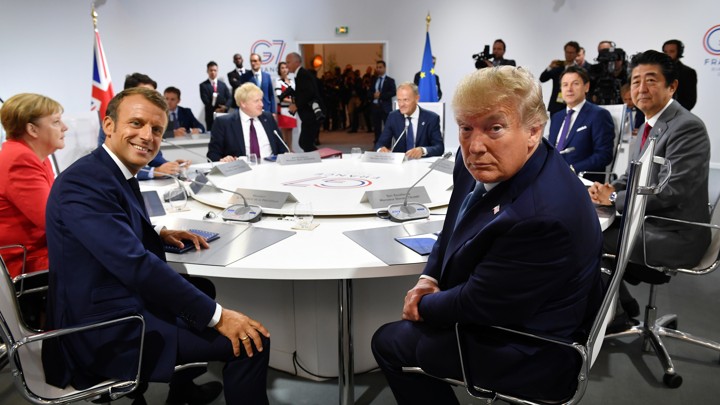This blog is written by senior AP Government and Honors Economics students at Aragon High School
Sunday, August 25, 2019
G7 Exposes Rift Between Trump and Allies
Sources: Business Insider, The Atlantic, and The New York Times
The G7 summit in France exposed great ideological differences between President Trump and the organization’s other members. Specifically, Macron’s decision to focus on so-called “niche issues,” such as Climate Change and gender/income inequality angered White House officials. They claimed that Macron was attempting to exclude Trump by discussing issues where the US president holds significantly different views from the other participants (Trump was the only leader present that doesn't believe in Climate Change). The American delegation says that it would have rather focused on trade and national security. However, it is worth noting that Trump is the only leader present who supports the trade war with China or ending the Iran Nuclear Deal.
The G7 or Group of Seven was created in the late 1970s as a forum for the world's major industrialized nations to discuss global economic and political issues. While its membership has changed over the years, it currently includes Canada, France, Germany, Italy, Japan, UK, USA, and an EU representative.
Questions:
1. How should the other leaders present approach Trump and vice versa?
2. What do these differences mean for the long-standing relationships between the USA and its allies?
Subscribe to:
Post Comments (Atom)

I think the best way for other leaders to deal with Trump at such a summit is to simply utilize the power of majority opinion. As long as the others agree on discussing issues such as climate change, they can effectively snub out Trump. I don't believe that would hurt the long-standing relationships between the US and our allies, as each administration only represents short term goals of the United States. As for Trump, he should give in to some discussion on topics less pertinent to his interests in order to make the other leaders more open to his proposals.
ReplyDeleteBut if the other leaders just force Trump to action through majority opinion, what would stop him from simply leaving the meeting and the G7? He has shown in the past that he is willing to take these extreme actions such as pulling out of NAFTA, or at least willing to threaten such action. Also, many of these issues are very pressing, and it isn't enough just to hope that the next administration is more willing to cooperate.
DeleteFirst of all, I do not believe that discussing topics where one leader may differ in opinion is in any way "excluding" anybody. But as for now, there is not much foreign leaders can do to address Trump given his volatile nature, which makes it quite hard to negotiate with him. (with the exception of Russia, of course). Ultimately, I believe that a large portion of foreign countries understand that Trump does not necessarily represent the majority of Americans' opinions as a whole. However, Trump is the face of the U.S, and has the duty of negotiating treaties with foreign nations. Thus, it seems he stands as a significant obstacle for simple negotiation, and will likely continue to be so as long as he is president. Victor made a really good point in that Trump is willing to take extreme action, which makes it even harder to truly negotiate.
ReplyDelete- Jung haye
DeleteMost of the time, when I think about Trump, there's kind of this general attitude of just "Oh, that's Trump. He's always like that, just let it happen" that doesn't really accomplish anything. On a larger scale, perhaps other world leaders just accept that he's ridiculous and doesn't admit to these issues, and skirt around it entirely. Approaching him, unless absolutely necessary, doesn't feel like it's worth the trouble. The so called "exclusion" is kind of a part of that package- if a single person in a crowd disagrees, it's unreasonable for the entire crowd to bend over backwards to accommodate. While compromise is great and should be attempted when possible, these issues really do need to be solved, or worked towards, as soon as possible. While I think Trump's whole administration will be somewhat of a stain upon U.S. governmental history, it's not something that is unfixable in the long term.
ReplyDeleteI think the best way for leaders to approach Trump is to try and explain things to him. If he doesn't listen (which i believe is likely) they could always overpower him with a majority. Trump however could always leave, which is an issue because countries rely on the U.S. for many things. Some rely on it for protection. It would be horrible if that were to happen, but its possible. As my colleagues have mentioned, Trump is willing to take extreme action, making it harder on the other countries to negotiate. Obviously, the relationship with the U.S. and its allies would get very tense but the allies can't do much as they don't have as much power as the U.S.. Therefore, they may search for outside support like Russia for instance or even China.
ReplyDeleteI believe that this is causing relationship between the US and their allies to become much more strained. The G7 is filled with some of the most committed US allies, and this is another example of how we are straying further from them due to Trump's diplomacy tactics. For industrialized nations, trade is certainly important, but the issue of climate change is equally as important to discuss. It is the definition of a global issue, so for world leaders in countries that have high pollution, it is extremely important for them to discuss how they are effecting the climate. I do not believe there is a way for this current administration to be approached besides total agreement with their policies, so our international relations will be harmed.
ReplyDelete